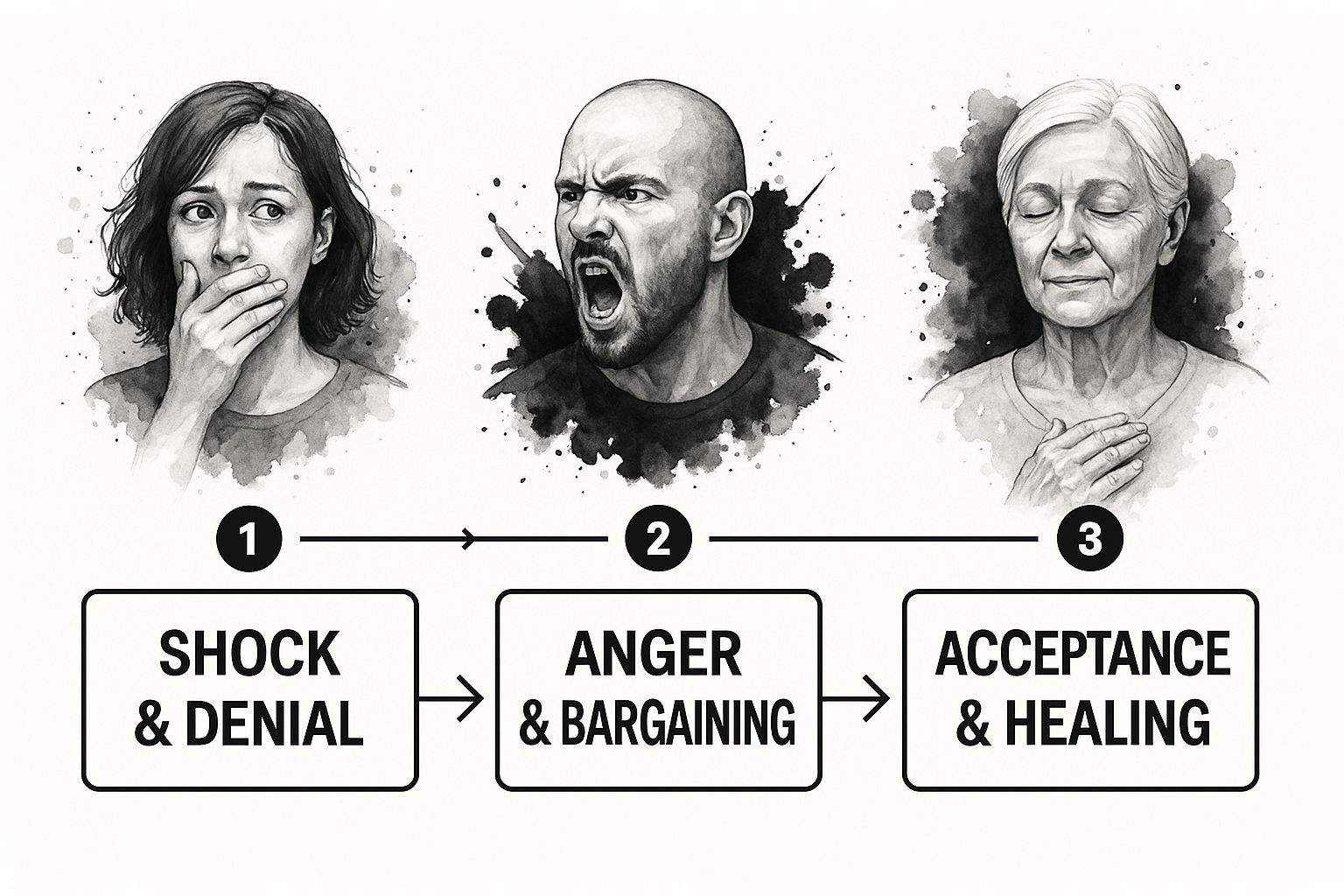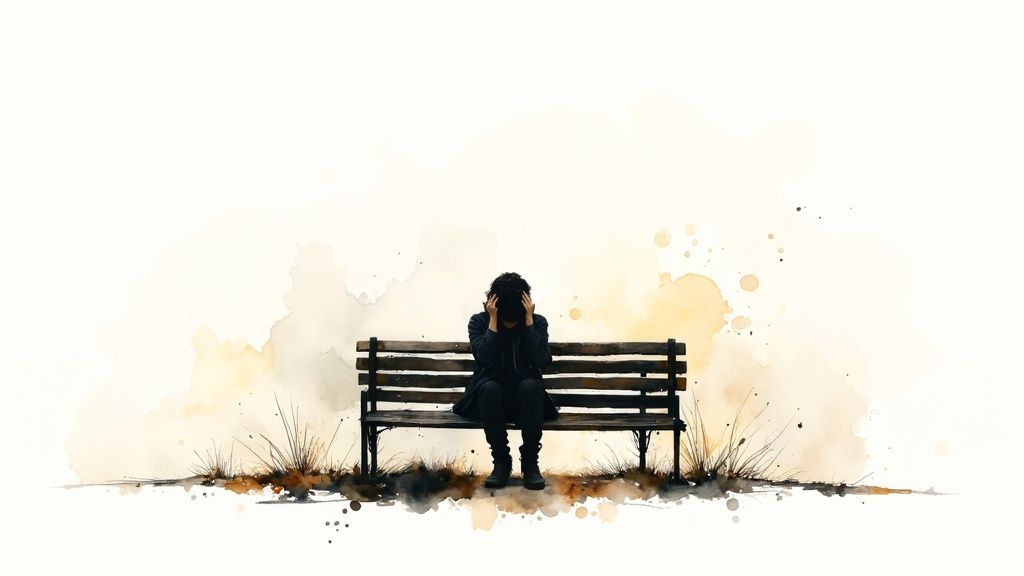Recovering from a breakup isn't about flipping a switch and feeling better overnight. It's a messy, personal journey of creating space—both emotionally and physically—letting yourself feel the hurt without judging it, and slowly, piece by piece, rebuilding your life around new routines and goals.
The process is never a straight line. But getting through the initial shock and setting a foundation for healing are the most important things you can do for yourself right now.
The First 48 Hours: What to Do Right After a Breakup
The moments immediately after a relationship ends are easily the most disorienting. Your world feels like it’s been turned upside down, and trying to see a path forward is like looking through thick fog.
The key is to focus on small, manageable actions. These tiny steps can bring a sliver of stability back into your life, even when everything else feels like it's spinning out of control. Your goal isn't to solve everything at once but to create a safe container for yourself to start healing.
Here’s where to start.
Create Some Breathing Room
This is non-negotiable. You need distance, both physically and digitally. Mute your ex on social media, put away the photos that are out in the open, and fight every urge to text or call them.
This isn’t about being cruel or petty. It's a critical act of self-preservation. You’re giving your mind the room it needs to process what happened without the constant gut punch of seeing their name or face pop up on your screen.
Find an Anchor in a Simple Routine
When your emotional world is in complete turmoil, structure becomes your best friend. Don’t worry about overhauling your life; just focus on the absolute basics.
Wake up at the same time every day. Eat regular meals, even if you don't feel hungry. Have a set bedtime. These small consistencies create an anchor in the storm and can make a surprisingly huge difference in how you feel.
Take Care of Your Body
Grief is physically exhausting. I mean, really exhausting. Your body is carrying the weight of this loss, and it needs support.
Make sure you're getting as much sleep as you can. Drink plenty of water and try to eat something nutritious. Even a short walk around the block can boost your mood, though I know it might feel like the last thing you want to do.
This image shows the emotional rollercoaster you can expect. It helps to know this is all part of the process.

Seeing this progression can help normalize what you're feeling and remind you that you're moving toward acceptance, even when it doesn't feel like it.
Your Immediate Post-Breakup Checklist
When you're overwhelmed, a simple checklist can be a lifesaver. Here are the essential first actions to protect your well-being right after a relationship ends.
| Action Item | Why It Matters for Your Recovery |
|---|---|
| Mute/Unfollow on Social Media | Prevents emotional triggers and gives you the mental space needed to heal without constant reminders. |
| Lean on One Trusted Friend | Isolating yourself is tempting but damaging. Talking to one person you trust makes you feel less alone. |
| Schedule One Small Thing to Do | It could be a walk, a coffee run, or watching a movie. It gives you a reason to get out of bed. |
| Write Down Your Feelings | Getting your thoughts out of your head and onto paper can provide immense relief and clarity. |
| Hydrate and Eat Something Simple | Your body needs fuel to process stress and grief. Don't neglect its basic needs. |
Think of this table as your emergency first-aid kit. These actions won't fix everything, but they will help you stabilize and get through the initial shock.
Build Your Foundation for Healing
The first few days are about one thing: survival. Don't pressure yourself to be productive or to "get over it." That’s not how healing works.
Think of this period as emotional triage. Your only job is to attend to your most immediate needs, stabilize your environment, and give yourself permission to feel whatever you're feeling without judgment.
This isn't the time for big, dramatic decisions, like throwing away every keepsake from the relationship. A much better approach is to gather any items that remind you of your ex, place them in a box, and store it somewhere out of sight. You can decide what to do with everything later when your emotions aren't quite so raw.
The goal right now is simply to reduce the painful reminders, not to erase your history. By taking these deliberate, gentle steps, you’re building a solid foundation that will allow you to process the pain without being completely consumed by it.
Working Through the Emotional Storm

Once the initial shock wears off, the real work begins. You're probably staring down a messy cocktail of emotions—grief, anger, loneliness, maybe even a strange sense of relief.
Trying to bottle that up? It's like trying to hold a beach ball underwater. Sooner or later, it's going to shoot to the surface, and usually with a lot more force.
The only way out is to go through it. Letting yourself actually feel the pain is a brave, necessary part of recovering from a breakup. This isn't about wallowing; it's about processing.
Giving Your Emotions a Voice
One of the best things you can do to make sense of the chaos in your head is to let it out. This doesn't have to be some big, dramatic scene. It can be a quiet, personal practice.
Journaling is a game-changer here. Seriously, write down everything you're feeling without censoring yourself. Get the anger out, the sadness, the moments you miss. No one else ever has to see it. The simple act of translating jumbled thoughts into words on a page can bring a surprising amount of clarity.
Another option is to talk to a trusted friend—the kind who really listens instead of just trying to "fix" everything. Right now, you don't need solutions. You just need a safe space to be heard.
Navigating the Mental Health Impact
A breakup isn't just an emotional gut punch; it can take a serious toll on your mental health. This is especially true for men, who often feel that societal pressure to just "be strong" and shove their feelings down.
The mental health risks are very real. A massive 2025 global review, which looked at data from over 106 million men, identified relationship breakdowns as a major risk factor for suicide.
The study found that divorced men had 2.8 times greater odds of dying by suicide. For recently separated men under 34, the risk was up to eight times higher than for their married peers.
Seeking help from a therapist isn't a sign of weakness. It's a sign of incredible strength and self-awareness. A good therapist gives you unbiased support and teaches you coping strategies that actually work for what you're going through.
Healthy Outlets for Emotional Release
Feeling your emotions is step one, but you also need to channel them in a healthy way. When that anger or frustration starts to boil over, you need a release valve. Here are a few things that can help:
- Intense Physical Activity: Go for a hard run. Hit a punching bag. Do a high-intensity workout until you're dripping with sweat. Physical exertion is an amazing way to burn off frustration and get a much-needed endorphin boost.
- Creative Expression: You don't need to be Picasso. Paint, draw, write a song, or even just scribble furiously on a piece of paper. The point is to get the emotion out of your body and onto something tangible.
- Structured Self-Care: Taking care of yourself is non-negotiable when you're going through this. Simple practices can make a huge difference. Consider incorporating regular massages for stress reduction to help release both the physical and emotional tension you're holding onto.
These intense feelings are all part of the healing journey. To get a better sense of what's ahead, take a look at our guide on the https://poke-match.com/stages-after-a-breakup/. Knowing the roadmap can make the entire process feel a lot less overwhelming.
Rediscovering Who You Are Now

It's completely normal to feel like a piece of you is missing after a relationship ends. When so much of your life was built around a "we," that sudden shift back to "me" can feel incredibly jarring, even empty. But this is your moment. This is your chance to reclaim your story.
This part of the healing process isn’t just about killing time until you feel better. It’s about actively rebuilding your sense of self. It's a powerful opportunity to reconnect with the person you were before the relationship and decide who you want to become next.
Reconnecting with Your Core Self
Think back for a second. What did you love to do before you were a couple? Did you spend Sunday mornings lost in a book, love painting, or go hiking with your friends every chance you got? Often, those are the very first things that get pushed to the side in a relationship.
Now’s the time to pull them back to the front. Making a real effort to dive back into these activities does more than just fill up your calendar. It’s a potent reminder of who you are at your core, completely independent of anyone else.
This isn't about trying to erase the past. It's about reintegrating the parts of yourself you may have set aside. Think of it as an act of remembering and honoring your own identity.
This is also a perfect invitation to try something brand new. Have you always been curious about pottery, wanted to try rock climbing, or thought about learning a new language? Signing up for a class or a workshop can inject some fresh, exciting energy into your life and help you create new, positive memories that belong only to you.
Building Resilience and Self-Compassion
Getting over a breakup involves more than just picking up new hobbies; it demands a real shift in how you treat yourself. Self-compassion and resilience are more than just buzzwords—they are the essential tools that will help you turn this painful experience into a catalyst for growth.
In fact, research highlights just how critical these psychological factors are. One 2025 study found that self-compassion alone was responsible for 12% of the variance in positive growth after a breakup. When you add in self-esteem, resilience, and optimism, these factors explained a huge portion of a person's ability to heal well. You can learn more about these post-breakup growth findings to see exactly how these traits help people recover.
Taking Center Stage in Your Own Life
A massive part of moving on is consciously re-centering the narrative on your own journey. A powerful way to do this is to embrace a 'main character' mindset, where you intentionally become the hero of your new life. This just means making choices that serve your happiness and well-being first.
Here are a few simple ways to start:
- Set a Small, Personal Goal: Maybe it's training for a 5k, trying one new recipe a week, or just reading ten pages of a book every night. Nailing small goals builds momentum and a much-needed confidence boost.
- Redefine Your Space: Rearrange your bedroom furniture or treat yourself to some new decor. Creating a physical environment that feels fresh and entirely yours can have a surprisingly powerful effect on your mental state.
- Practice Saying "Yes" to New Things: Accept that coffee invitation from a coworker. Go to that community event you were on the fence about. Every new experience helps you build a life that feels full and vibrant on its own terms.
Even as you do all this, you might still find your thoughts drifting back to your ex. For more direct strategies on shutting down those intrusive thoughts, check out our guide on how to stop thinking about an ex. The whole point of this journey of rediscovery is to create a future so exciting that the past starts to lose its grip.
Building a New Life That You Love
Healing isn't just about sitting around, waiting for the pain to fade. It’s about getting in the driver's seat and actively building a future that genuinely excites you.
This is the point where you shift from a passive state of recovery to becoming the architect of your own happiness. The goal here is to build a life so full and vibrant that your past relationship becomes just one chapter of your story, not the whole book.
One of the most powerful things you can do right away is reconnect with your support system. Your friends and family are your anchors in this storm. Reach out, make some plans, and let them remind you of who you are outside of the relationship you just lost. That social connection is an incredible buffer against the loneliness that loves to creep in after a breakup.
Crafting New Routines and Traditions
A huge part of that post-breakup emptiness comes from having your shared habits ripped away. The person you texted all day is gone, and the routines you built together have vanished. This is your chance to create new ones that are entirely your own.
Think about what would bring you real, honest-to-goodness joy. This isn't just about filling time; it's about being intentional with your days and filling them with activities you truly love.
- Claim a new weekly ritual. Maybe Friday nights are now for a solo movie marathon with your favorite takeout. Or maybe Sunday mornings are for exploring a new hiking trail you've had your eye on.
- Redecorate your space. It's amazing what a difference this can make. Rearranging furniture, buying new bedding, or adding a few plants can make your environment feel fresh and completely yours, helping to overwrite old memories.
- Plan a solo trip. This doesn't have to be some grand international adventure. A weekend trip to a nearby town can be incredibly empowering and helps build confidence in your own independence.
By consciously creating these new patterns, you start to rewrite your daily narrative. Each new tradition is a small but firm step toward a life that feels whole all on its own.
Remember, the point isn't to replace your ex. It's to replace the old, shared habits with new, self-affirming ones. You are actively choosing to invest in your own well-being and your future.
Finding Purpose Outside Yourself
Another powerful way to build a new life is to look beyond your own pain and connect with something bigger than yourself. When you direct your energy outward, it can give you a profound sense of purpose and a much-needed dose of perspective.
Consider dedicating some time to a cause you've always cared about. Volunteering at an animal shelter, helping with a community garden, or getting involved with a local charity shifts your focus from your own heartbreak to the needs of others. Not only does it feel good, but it also connects you with new people who share your values.
This entire process of building a life you love is how you truly recover from a breakup in the most meaningful way. It's about taking deliberate, consistent action to create a future that isn't just bearable without your ex, but one that is genuinely exciting because it's built by you, for you.
How Long Does It Take to Heal From a Breakup?

It’s the question I hear more than any other: "When is this going to stop hurting?" The honest, and admittedly frustrating, answer is there's no magic number. Healing from heartbreak doesn't follow a neat calendar.
Your personal timeline is shaped by a whole mix of things. The length of your relationship, the depth of your bond, and how things ended all play a huge role. A two-year relationship that ended on good terms will have a completely different healing path than a ten-year marriage that ended in betrayal.
Your own life circumstances are just as important. Think about your support system, your past experiences with loss, and your own emotional resilience. All of these things influence how you process the pain and eventually move forward.
The Myth of a Straight Line to "Healed"
One of the biggest traps people fall into is thinking that recovery is a straight line from heartbroken to healed. The reality is much messier. You'll have good days where you feel a flicker of hope, only to get slammed by a wave of grief the next day that feels as raw as day one.
This up-and-down journey is completely normal. A bad day doesn't mean you're failing or that you’ve lost all your progress. It just means you’re human. Healing is often two steps forward, one step back.
It is absolutely crucial to give yourself some grace on those tough days. Let yourself feel it, be kind to yourself, and remember that it will pass. The goal isn't to never feel sad again; it's to get to a place where the good days slowly but surely start to outnumber the bad.
What the Data Suggests
While there's no universal stopwatch for heartbreak, we can look at some research to get a bit of perspective. For example, one 2025 aggregate study found that for couples who eventually got back together, the average time they spent apart was around 7.3 months. That timeline often got longer if an ex started a new relationship.
This kind of data just goes to show how complex the whole process is. There’s no single answer.
The key takeaway here is to focus less on the when and more on the how. The question of how long it takes to fall out of love is less about counting the days and more about what you do with those days.
Ultimately, your recovery isn't about hitting a specific date on the calendar. It’s about using this time for some real self-reflection and personal growth. It’s about building a life that you genuinely love, rediscovering your own strength, and finally reaching a point where the past doesn't have a hold on your present. That journey is uniquely yours, and it will take exactly as long as it needs to.
Your Breakup Questions, Answered
Working through a breakup is messy, and it’s completely normal to feel lost. While every relationship is different, some questions and hurdles seem to pop up for almost everyone. Let's tackle some of the trickiest questions you're probably wrestling with as you figure out how to heal.
Is It a Good Idea to Be Friends with My Ex?
The short answer? Probably not. At least, not right now.
A genuine friendship needs emotional neutrality to survive, and that’s the one thing you absolutely don't have when your heart is still in pieces. Trying to jump straight into a friendship is usually just a recipe for more pain.
It blurs the lines, gives one (or both) of you a false sense of hope, and basically keeps you chained to the past. You can't truly move on if they're still a central figure in your life. A clean break—meaning a solid period of no contact—is what you need to find your footing again and process everything without their influence.
Down the road, once you’ve genuinely healed and feel completely whole on your own, you can think about it. But if you do, make sure it’s a conscious choice from a place of strength, not a desperate attempt to keep them around.
How Can I Stop Thinking About My Ex?
Let's be real: trying to force yourself to stop thinking about them is like trying not to think about a pink elephant. It’s impossible, especially in the beginning. Your ex is going to take up a lot of mental real estate for a while.
The goal isn't to erase them from your memory. It's to slowly dial down the power those thoughts have over you.
A great first move is to practice a little mindfulness. When a thought about them pops up, just acknowledge it. Don't beat yourself up for it. Then, gently bring your focus back to whatever is right in front of you—the sound of the coffee maker, the feeling of your feet on the floor, anything.
The other big strategy is to get busy. Idle time is not your friend right now. Fill your schedule with things that demand your attention and, more importantly, bring you a little bit of joy.
- Dive into a new hobby that actually challenges your brain.
- Schedule regular time with friends who know how to make you laugh.
- Create new, positive memories in places you used to go together. It helps overwrite the old associations.
As you start building a new life that you're genuinely excited about, you'll find the thoughts about your ex naturally start to fade into the background.
When Am I Ready to Start Dating Again?
There’s no magic timeline here. It’s not about a certain number of weeks or months. It’s all about your mindset.
You're probably in a good place to start dating when you feel happy and complete all on your own. You're looking for someone to add to your already great life, not someone to complete you or fix your loneliness.
Here are a few good signs you're getting there:
- You don't have a constant, nagging urge to bring up your ex in every conversation.
- You've worked through the worst of the grief and anger.
- You feel a real sense of excitement about meeting someone new, without immediately comparing them to your ex.
If your main reason for wanting to date is to feel less lonely, prove a point, or make your ex jealous, that’s a huge red flag. You need more time. Jumping into a "rebound" relationship isn't fair to you or the new person you're pulling into your drama.
What Should I Do If I See My Ex with Someone New?
This one is a gut punch. Seeing your ex with a new partner is easily one of the most painful moments in the whole breakup process. First things first: let yourself feel it.
Hurt, rage, jealousy, crushing sadness—whatever comes up, it's valid. Don't you dare judge yourself for having those feelings.
Vent to a trusted friend who can just listen. And most importantly, repeat this to yourself: their new relationship doesn't erase what you had. It also doesn't say anything about your worth. Their journey is their own now.
This is the moment to double down on your own healing. Mute or block them on social media to protect your peace. Take all that emotional energy you're feeling and pour it right back into your own path forward.
Navigating the complexities of relationships and breakups can feel isolating, but you don't have to do it alone. At Poke Match, we provide expert advice and practical strategies to help you build healthier, more fulfilling connections. Explore our resources and find the support you need at https://poke-match.com.
